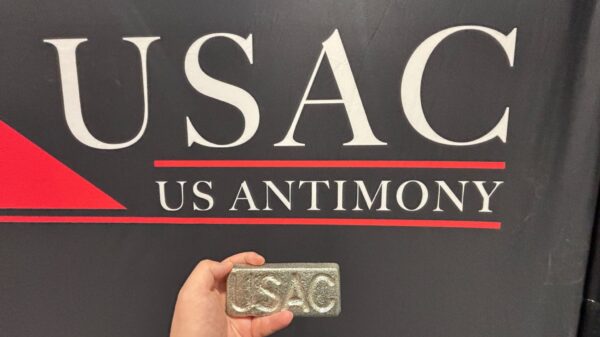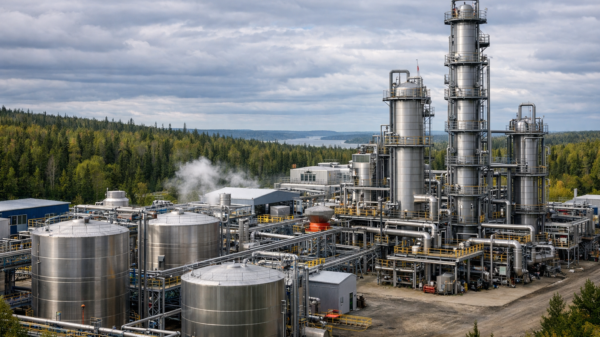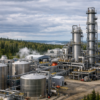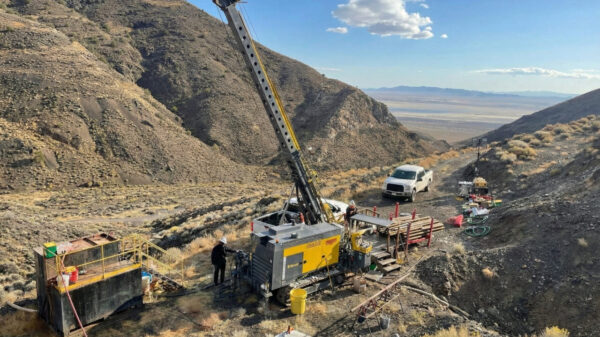The geopolitical tensions between China and the United States over critical minerals have intensified, showcasing the strategic importance of these resources. China’s dominance in the global supply chain controlling approximately 85 to 90 per cent of rare earth element (REE) refining and 60 per cent of lithium production places significant leverage in its hands.
This control has led to export restrictions on materials like antimony, gallium, and germanium, which are essential for semiconductors and defense technologies . In response, the U.S. has initiated efforts to diversify its supply chains, including investing in domestic production and forming international partnerships through initiatives like the Minerals Security Partnership.
Specifically, antimony has become something of a hotbed case for the Trump administration.
According to a report on critical minerals released in January of 2025, antimony isn’t just a commodity. It’s actually a cornerstone of military preparedness and economic resilience.
Furthermore, these minerals are foundational to a vast range of essential products and technologies, from flame retardant materials that protect lives and infrastructure to batteries that power vehicles, backup systems, and renewable energy grids. Antimony’s unique chemical properties enable critical applications in defense, electronics, transportation, and safety, making it indispensable.
Recognizing this, President Trump implemented the FAST 41 program, aiming to expedite federal permitting for critical infrastructure projects. In April 2025, the White House announced that 10 mining projects across the U.S. would be fast tracked under this initiative, focusing on essential minerals like copper, antimony, and lithium. Companies such as Perpetua Resources, Rio Tinto, Hecla Mining, among others were among the beneficiaries.
Other companies, especially gold miners like NevGold Corp (CVE: NAU) (OTCMKTS: NAUFF) (FRA: 5E50) have also focused on boosting their antimony production alongside their gold.
Here are five companies manufacturing products that absolutely need antimony.
Teledyne Technologies
Teledyne Technologies Incorporated (NYSE: TDY) is a U.S. based industrial conglomerate that designs and manufactures high performance technologies for critical applications.
Headquartered in Thousand Oaks, California, Teledyne operates across sectors such as aerospace, defense, marine, energy, and scientific research. The company was founded in 1960 and has since grown into a leading supplier of advanced instrumentation, digital imaging products, aerospace electronics, and engineered systems. Its operations span North America, Europe, and Asia, with customers ranging from NASA to private manufacturers and government agencies.
Teledyne produces infrared sensors, aerospace systems, and defense electronics essential to modern military and industrial infrastructure. These technologies play a pivotal role in navigation, threat detection, situational awareness, and automation. A key component in its thermal imaging systems is indium antimonide (InSb), a compound semiconductor that enables precise infrared detection. Without antimony, this type of imaging would lack the sensitivity and efficiency required for many high stakes applications.
Antimony helps Teledyne’s sensors detect thermal signatures in low visibility environments. These systems are vital for military operations, firefighting, law enforcement surveillance, and industrial safety monitoring. Teledyne’s imaging technologies are also used in autonomous vehicles, smart manufacturing systems, and border control infrastructure.
Teledyne continues to invest in innovation, especially in sensor technology and aerospace electronics. As global demand for surveillance, automation, and safety increases, Teledyne’s antimony enabled technologies remain central to both national security and commercial advancement.
Read more: NevGold closes its Nutmeg Mountain acquisition with Goldmining for $3 million
Read more: NevGold’s long intervals of antimony & gold mineralization turn heads
General Motors
General Motors Company (NYSE: GM) is one of the largest automobile manufacturers in the world. It holds it headquarter in Detroit, Michigan. Founded in 1908, GM operates global brands such as Chevrolet, GMC, Cadillac, and Buick. The company designs and manufactures vehicles across a wide range of platforms, from internal combustion engine (ICE) models to hybrid and electric vehicles (EVs). With manufacturing plants and R&D facilities spanning North and South America, Asia, and Europe, GM plays a vital role in global transportation infrastructure. It also invests heavily in autonomous driving technologies and battery innovation.
GM manufactures automobiles that use both traditional and emerging powertrain technologies.
While the company is transitioning toward electric vehicles, millions of its gasoline and hybrid models still rely on lead acid batteries. These batteries contain lead antimony alloys, which help increase durability, reduce self discharge, and improve thermal stability. Antimony’s role in these systems is crucial to the reliable performance of start stop functions, vehicle lighting, and onboard electronics.
Antimony hardening of lead plates allows batteries to function consistently in extreme temperatures and high vibration environments. These qualities are especially important in vehicles that experience frequent short trips or variable weather conditions. Even as lithium-ion batteries dominate EV platforms, lead antimony systems remain essential in conventional and hybrid models.
GM’s vehicles serve as daily transportation for millions of people around the world. Its supply chain includes critical mineral inputs, including antimony, that ensure reliability and performance. Furthermore, backup batteries and auxiliary systems in EVs often still use lead antimony technology.

A sample of electric vehicles using antimony. Image via GM Canada.
Albemarle Corporation
Albemarle Corporation (NYSE: ALB) is a global specialty chemicals company headquartered in Charlotte, North Carolina. Founded in 1994 as a spin off from Ethyl Corporation, Albemarle has grown into a major producer of lithium, bromine, and catalysts, supplying markets across more than 100 countries. The company plays a central role in enabling modern energy storage, flame retardancy, and cleaner transportation technologies. With operations in North America, South America, Europe, the Middle East, and Asia, Albemarle is deeply embedded in the global supply chain for electric vehicles, electronics, pharmaceuticals, and consumer goods.
Albemarle manufactures bromine based flame retardants that are used in a wide variety of industrial and consumer products. These flame retardants require antimony trioxide as a synergist to meet safety and performance standards. Additionally, the combination of bromine and antimony compounds enhances flame resistance in plastics, textiles, construction materials, and electronics. Without antimony, many of these materials would fail to meet fire safety regulations.
Antimony trioxide works alongside bromine compounds to interrupt the combustion process, reducing flammability and smoke generation. This technology is essential for producing fire resistant insulation, circuit boards, automotive components, and household appliances. Albemarle’s customers include manufacturers of electronics, building materials, and transportation systems, all of which depend on stringent fire performance standards.
Flame retardants produced by Albemarle are found in everyday products that must pass regulatory fire tests. These include televisions, car interiors, server housings, and construction insulation. By supplying critical chemical additives, Albemarle helps industries meet both safety codes and consumer expectations.
As demand grows for safer, more sustainable materials, Albemarle continues to invest in innovation and environmental stewardship. Its antimony enabled flame retardants remain vital to product safety across sectors.
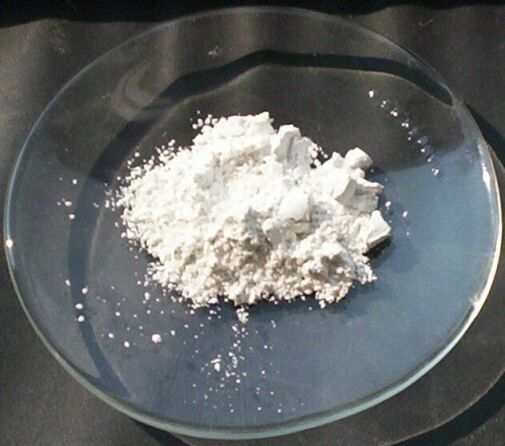
Image from Walkerama via wikimedia commons.
EnerSys
EnerSys (NYSE: ENS) is a global leader in stored energy solutions, headquartered in Reading, Pennsylvania. Founded in 2000, the company designs, manufactures, and distributes industrial batteries, chargers, and related equipment. EnerSys serves diverse markets such as telecommunications, aerospace, defense, transportation, and renewable energy. With manufacturing and distribution facilities worldwide, EnerSys supports critical infrastructure by providing reliable energy storage for mission critical applications across more than 100 countries.
EnerSys produces industrial batteries that power essential systems in data centers, telecom towers, uninterruptible power supplies (UPS), and renewable energy storage. A core technology in many of its lead acid batteries is the use of lead antimony alloys to reinforce battery grids. This alloy also improves battery durability, charge efficiency, and resistance to corrosion and thermal stress. Subsequently, antimony is essential for ensuring these batteries perform reliably in demanding environments.
The antimony hardening process enhances battery lifespan and stability, making it suitable for deep cycle and standby power applications. These batteries must maintain consistent output despite temperature fluctuations, frequent cycling, and high electrical loads. EnerSys’s products help keep communication networks, emergency services, and industrial operations running without interruption.
In industries like aerospace and defense, EnerSys supplies specialized batteries designed to withstand extreme conditions. The company also supports the growing renewable energy sector by providing energy storage solutions that help integrate solar and wind power into the grid. Antimony’s role in these battery systems ensures dependable energy storage that supports global electrification efforts.
EnerSys continues to innovate in battery technology to meet evolving customer needs. Its antimony enhanced lead acid batteries remain a backbone of critical infrastructure worldwide.
Read more: NevGold pulls up even more promising antimony grades from Nevada property
Read more: NevGold’s Nevada property may just be the next American antimony resource of scale
BASF SE
BASF SE (OTCMKTS: BASFY) (ETF: BAS) is a German multinational chemical company headquartered in Ludwigshafen, Germany. Founded in 1865, BASF is the largest chemical producer in the world. The company operates across a broad spectrum of industries, including chemicals, plastics, performance products, agricultural solutions, and more. BASF’s global presence spans over 90 countries, serving automotive, construction, electronics, and consumer goods sectors. Its innovations focus on sustainability, advanced materials, and chemical solutions that improve everyday products and industrial processes.
BASF manufactures advanced plastics, coatings, and chemical formulations essential for a wide range of applications. Many of these products depend on antimony trioxide as a flame retardant additive. Antimony trioxide acts as a synergist with halogenated compounds to enhance fire resistance and reduce smoke generation in materials such as plastics, textiles, and coatings. Without antimony, these materials would fail to meet strict fire safety regulations in construction, electronics, and transportation.
Antimony trioxide’s flame retardant properties also help BASF develop materials that protect buildings, vehicles, and electronic devices from fire hazards. This is crucial in products like automotive interiors, electrical housings, cables, and insulation materials. By incorporating antimony based flame retardants, BASF ensures these products comply with global fire safety standards and perform reliably under stress.
Furthermore, the company’s flame retardants support safer living and working environments worldwide. BASF collaborates closely with manufacturers to tailor chemical solutions that balance performance, cost, and environmental impact. As demand grows for fire safe, sustainable materials, BASF continues to innovate in antimony enhanced technologies.
BASF remains a foundational supplier of antimony based flame retardants. These products also play a vital role in making modern life safer and more sustainable across multiple industries.
.
NevGold Corp is a sponsor of Mugglehead news coverage
.






